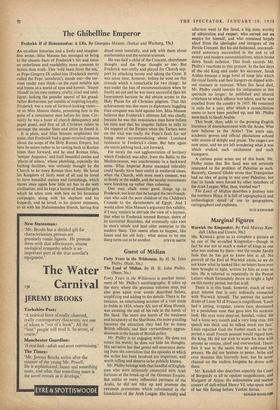The Ghibelline Emperor
Frederick II of Hohenstaufen: A Life. By Georgina Masson. (Seeker and Warburg, 35s.) AN excellent historian and a lively and imagina- tive writer, Miss Masson has managed to bring to the chaotic facts of Frederick's life and times an orderliness and readability more common to fiction than truth. This 'wild beast from the sea,' as Pope Gregory IX called him (Frederick merely called the Pope 'antichrist), stands out—the ner- vous reader may think—as the most notable ape and hyena in a world of apes and hyenas, 'Stupor Mundi' to his own century, crafty, cruel and intel- ligent, lacking the popular appeal of his grand- father Barbarossa, yet capable of inspiring loyalty, Frederick was a man of forward-looking views— or so Miss Masson thinks, presenting him in the guise of a renaissance man before his time. Cer- tainly he was a hater of church delinquency and papal greed, and first of all Christian rulers to envisage the secular State and strive to found it.
It is plain, and Miss Masson emphasises the point, that Frederick had a quasi-mystical opinion about the scope of the Holy Roman Empire, but here he seems rather to be casting back to Roman times than forward, and he used Roman titles, `semper Augustus,' and built beautiful castles and 'places of solace,' whose plumbing, especially the bathing, facilities, was certainly thought by the Church to be more Roman than holy. He loved his Kingdom of Sicily most of all and he loved to have beautiful statues and furnishings, which shows once again how little art has to do with civilisation, and he kept a harem of beautiful girls which he often took with him on his ferocious campaigns, along with his elephant and his leopards, and he loved, in his quieter moments, to sit with his Mahommedan friends, having first dined most tastefully, and talk with them about mathematics and the natural sciences.
He was half a child of the Crescent, churchmen thought, and the Pope thought so too. But Frederick was crafty and played for Church sup- port by attacking heresy and taking the Cross. It was some time, however, before he went on this crusade which is remarkable for two things : he was under the ban of excommunication when he finally set out and he was more successful than his forerunners because he did obtain access to the Holy Places for all Christian pilgrims. That this achievement was due more to diplomatic haggling than conquest was held against him. Miss Masson believes that Frederick's ultimate fall was chiefly because he was this renaissance man born before his time and that his singular failure to rally to the support of the Empire when the Tartars were on the trail was really the Pope's fault for not being more accommodating about Lombard resistance to Frederick's claim. But here again she seems jobbing back, not forward.
For surely the vast agglomeration of territory which Frederick was after, from the Baltic to the Mediterranean, was anachronistic in a backward sense. What Imperial Rome managed tolerably could hardly have been useful in medimval times, when the Church, with most men's consent, was so firmly in the saddle, and the secular movements were breaking up rather than cohering.
One may chalk some good things up to Frederick, not least that he hanged the two French- men who sold the poor children-of the Children's Crusade to the slavemasters of Egypt. And I would allow Miss Masson's argument this validity, if I may venture to obtrude the view of a layman, that what to Frederick seemed Roman, shorn of its territorial flourishes, did eventually take root in men's minds and lead after centuries to the modern State. This seems often to happen, like Jason and his old lady : what seems to be one thing turns out to be another. STEVIE SMITH


































 Previous page
Previous page